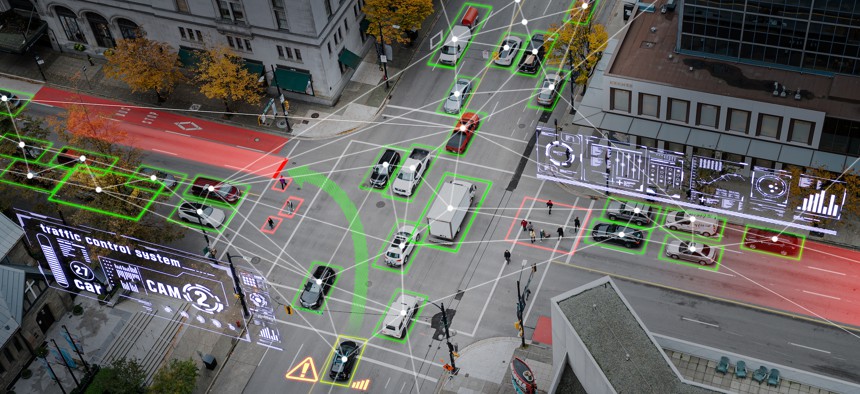Transportation launches $15M AI effort to improve US street infrastructure

choi dongsu/Getty Images
The program marries existing agency priorities with emerging technologies, and asks small businesses to drive innovation in infrastructure data visualization.
The Department of Transportation is allocating $15 million in federal funding for small businesses to take advantage of artificial intelligence systems and create new applications specifically for the U.S. transportation sector.
Announced on Friday, the Transportation’s Small Business Innovation Research Program will spearhead the Complete Streets AI Initiative to bring AI and machine learning solutions to transportation infrastructure. The program is intended to foster decision-support tools for state and local governments that can help design and deploy a network of Complete Streets, a longstanding agency initiative to support the construction of livable, connective public streets.
Bridging existing data gaps is a key feature of this initiative, with some areas of the U.S. lacking the necessary traffic or sidewalk data to improve local infrastructure.
“Innovation in the AI and transportation sector is happening at unprecedented speed and has the potential to address some of our most pressing transportation challenges,” said Transportation Secretary Pete Buttigieg in a statement. “This funding supports our country’s small businesses and startups to harness cutting-edge technologies, deploy them in local communities, and make our streets safer.”
The Complete Streets AI Initiative will feature multiple phases. In this initial round, 10 Phase 1 contracts will be awarded to small businesses looking to leverage automated data analytics to develop Complete Streets across the country.
The AI systems themselves will likely be formed from a suite of interactive data analytics tools intended for city and urban planning professionals. In addition to automation, other advanced technologies Transportation is looking for include systems operating on the internet-of-things; satellite, aerial or street-level videography; and computer vision.
By incorporating these systems, the Transportation expects applicants to generate interactive maps and other visualizations to better understand current street and traffic conditions, as well as citizen mobility. The platforms developed by small businesses should also be suitable for users in the private sector, non-profit and academic industries.
“Complete Streets are easier to plan with more complete data,” Robert Hampshire, principal deputy assistant secretary for research and technology and chief science officer, said in the press release. “This is a bold effort to build out that data along with the technology platforms that make it easy to use.”
The deadline for pre-solicitation dates is March 1.






